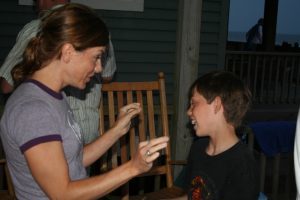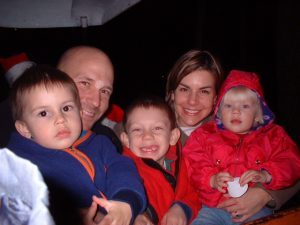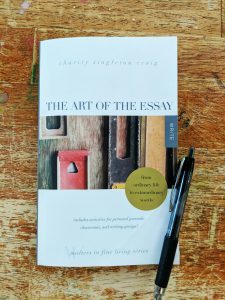Rebecca Brewster Stevenson's Blog: Small Hours, page 2
January 29, 2020
Teaching the Gospel to Children: Enjoy!
This post is the first of a series, and is meant to be preceded in reading by an introductory letter. Please read that HERE.

Enjoy Your Children
“Children should be seen and not heard.” ~ English proverb
“The LORD your God is with you,
He is mighty to save.
He will take great delight in you,
He will quiet you with his love,
He will rejoice over you with singing.”
Zephaniah 3: 17
“It’s you I like.” ~ Mister Rogers
When we were children, my sisters and I spent Julys with our grandparents. We lived in Pittsburgh; they lived on Long Island. We would travel there at the end of June and my parents would stay for a week, then they would return home while we stayed behind.
Over those weeks, my grandparents pretty much left us to our own devices. Our grandfather taught us to sail and dive and occasionally took us on errands; we helped our grandmother with chores. But on our own, we walked to the beach and home again. We played with our cousins and some neighborhood children. It was a normal and quiet life, unmarked by special activity: we never once went for ice cream or to the movies, never played a round of mini-golf. Our outings were to church and library, grocery store and, with our grandfather, the lumberyard. For the most part, we lived with our feet in the sand and our noses in books until our parents returned for us at the end of the month.
But one thing was certain about that time with our grandparents: they enjoyed it. They enjoyed us. They wanted us there with them.
One way my grandmother made this clear was at the start of the day. I remember coming down the stairs looking forward to my morning greeting, because it was always full of delight. “Well, good morning!” my grandmother would exclaim, all smiles, with an embrace as if I had just arrived after an absence of months. My being there–the mere fact of my presence in her kitchen–was for her an exaltation.
Looking back on this as the mother of grown children, I’m grateful and a little amazed. What a beautiful thing for a child to be welcomed like this, not just at the beginning of a visit, but every day.
It was a gift to be enjoyed.
The Problem with Enjoyment
 Fact: (with rare and tragic exception) parents love their children. But do they enjoy them?
Fact: (with rare and tragic exception) parents love their children. But do they enjoy them?
Here’s something I’ll bet you’ve noticed about caring for children: it’s daily. Sometimes it’s tedious. It looks like meeting needs and weighing demands, keeping schedules and finding socks. It’s preparing meals and cleaning plates, teaching chores and repeating yourself. Through and under all of this runs a deep and necessary love. It’s that love, in fact, that motivates it all. It’s why you make them brush their teeth and take them to soccer practice.
But it’s that very ordinariness that can make it all lackluster, that can suck the enjoyment clean away. You are tired, they are tired, and if they don’t go to bed five minutes ago, you may very well lose it.
The enjoyment of our children is embattled in another way, too: sometimes we don’t enjoy our children because of our children. I, for one, have known first-hand what it’s like to have my child turn into a screaming dragon in the check-out line at the K-Mart. And while I’m not naming names, I am willing to admit that there was absolutely nothing I found enjoyable about her at the time.
Our children have tempers. They have moods. They have quirks and tendencies that can amount to maddening. They are mean to each other; they are rude to us; they embarrass us in public places. Their knock-knock jokes stop being funny somewhere near round five or they were never funny in the first place and we are too tired to muster a laugh. What’s to enjoy?
No one is enjoyable all the time.
And yet I argue that we do best not just to love our children, but to enjoy them. I think one of the best ways to teach our children the gospel love of Jesus is all wrapped up in enjoyment.
Isn’t Love Enough?
Quick answer: Yes.
But bear with me a minute, because love and enjoyment communicate differently. See:
When I was in middle school, my dad had to change jobs. Suddenly his daily commute became an hour each way, a tedium that he really disliked.
We could have sold our house and moved to a different part of the city, but he and my mother weighed this option against the needs of their three daughters who were thriving at school and church. To move meant upending this–and they didn’t want to do it. So we stayed in our community and my dad commuted to work, and that commute brought him a lot of stress.

He chose to do this out of love for us–but love can’t always communicate the way we want it to. At the time, my sisters and I couldn’t comprehend his sacrifice.
Love is essential to parenting, but it can be hard. It provides your meals, your home and your clothes, but it also disciplines you so that you know right from wrong. Love makes you make your bed or write a thank-you note or miss a friend’s birthday party because you’re sick.
Enjoyment, on the other hand, always communicates joy. And it isn’t just joy in a general kind of way. Enjoyment of a child communicates joy to that child about herself. It speaks approval and delight. It says, “I like you.”
A child who lives with this kind of a blessing is far more likely to believe the gospel, because when we enjoy our children, we are telling them something True.
God’s Delight
 The Bible shows us that God delights in his creation. And above all other parts of that creation, he delights in people. Of everything he made in the Genesis account, God said it was “good,” but when it came to human beings, he called them “very good.”
The Bible shows us that God delights in his creation. And above all other parts of that creation, he delights in people. Of everything he made in the Genesis account, God said it was “good,” but when it came to human beings, he called them “very good.”
We’re told that we’re made in God’s image, but that doesn’t simply mean that we are, like him, thinkers and creators. It means that each of us bears his imprint, and uniquely so. We all know this at some level. Deep down, we recognize the inimitable value of the other: no matter how much we appreciate or fail to appreciate someone, we know that that someone is–in a world of billions–irreplaceable.
Parents know this better than anyone else.
Which is perhaps a reason why, when God sought to show his love for us, he sent his Son. As Father, he knows what it is to watch a child suffer and die. This was his son, his only child, the one of whom he said, “I am well pleased” (Matthew 3: 17, emphasis mine). The Father delighted in his Son, and this Son in his Father.
And now, through this Son’s death and resurrection, the Father makes himself adoptive parent to anyone who will have him. He wants everyone to be his child. There isn’t an unredeemable soul in the world.
Each person is precious to him. Each person uniquely bears his mark. He knows mole and freckle, penchant and habit. He knows what we enjoy doing. In fact, he made us to enjoy these things, and part of our enjoyment is God’s own pleasure in it.
The Bible says that he counts the hairs of our heads and stores our tears in a bottle. Why? All scripture points to the answer: because we are his delight.
He enjoys us.
Our Delight
 Enjoying our children, then, communicates just a piece of God’s own enjoyment to them. Or, at the very least, it opens a way for them to receive that enjoyment. It makes God’s enjoyment of them more believable.
Enjoying our children, then, communicates just a piece of God’s own enjoyment to them. Or, at the very least, it opens a way for them to receive that enjoyment. It makes God’s enjoyment of them more believable.
Parenting provides us a unique view on to the value of the other. And the truth is, despite their challenging tendencies and our exhaustion, we value our children deeply. We know more intimately than anyone the moles and freckles, the penchants and habits. We know their favorite foods and colors, their ticklish spots and where their scars came from. We delight in their uniqueness, in what makes them inimitably them.
The trick is in showing them that they are enjoyable. On any given day we tolerate them. We certainly love them. But we want to actively enjoy them.
Please remember what I said earlier: no one is enjoyable all the time, but here are some thoughts that might help.
Your child wants to be enjoyed by you. While it was natural for my grandmother to exclaim her delight, that might not be at all natural to you. Show your child your delight in whatever way works for you. You might be a hugger. You might be a hair-tussler. You might write notes on the lunch napkin or make pancakes on Saturday mornings. Anything works as long as it’s real and well-received. And the beauty is that children naturally know how to read enjoyment in a wide variety of ways. You don’t have to do what my grandmother did. Your child wants to be enjoyed by you.
Enjoyment of the other expands us. Learn to enjoy what your child enjoys–even if it’s the smallest aspect of the thing. Your daughter may adore playing Lego and you simply can’t abide it; but if nothing else you can appreciate your daughter’s appreciation. And you can work to find something else that you can enjoy with her.
Practice self-care. Despite our awareness of enjoyment’s value, the barriers remain. Fatigue is real, as are the demands that keep us from enjoying one another. As parents and guardians, we need to take care of ourselves. We need breaks from our children just as much as they need downtime. Tending to our needs makes us better able to tend to those of others–and it creates space for us to better enjoy our children.
Establish routines. A means to self-care is to create and live in routine. Regular bedtime works magic for a weary parent–and it’s pretty great for children, too, even if they resist. I wrote more about this HERE. Maybe you’d like to read it.
It’s perfectly normal to find your child unenjoyable. Children go through developmental stages that make life difficult for everyone, even themselves. They also go through phases we find maddening (endless poop jokes, anyone?). Be patient with your child and with yourself. Find help in the wisdom of your spouse, other parents, and in the community of your church. Ask for wisdom in your prayers (James 1: 5-7). And remember that parenting not only guides children into adulthood; it also changes and cultivates us. When we bring our needs–in parenting and anything/everything else–to God, he meets, strengthens, teaches, and blesses us with more of himself.
Enjoy!
 Last week I spent time with a friend who has been a mother for just over two weeks. As her darling newborn slept in my arms, she told me about her labor and delivery, the trauma and fatigue and nervousness of having this baby.
Last week I spent time with a friend who has been a mother for just over two weeks. As her darling newborn slept in my arms, she told me about her labor and delivery, the trauma and fatigue and nervousness of having this baby.
And we laughed together over the absurdity of leaving the hospital. As new parents, you barely know what you are doing, and yet they send you off as though everything will be fine. And, often enough, it is fine–but maybe you’d like an instruction manual of some sort, a reference guide to consult in those inevitable moments of confusion.
It would tell you when to feed the baby, how to discern an angry cry from a pained one, how to clip fingernails without clipping fingers, how in the world to swaddle.
And, in my opinion, it should have one last little word of counsel, appended to the end of the list. Just a reminder when the nights have been sleepless or when the baby finally sleeps through the night, when you realize you have no idea what you’re doing or when you don’t have the energy to think about it:
This child has been given to you for just a little while, yours to comfort and care for and delight in. Enjoy!
The post Teaching the Gospel to Children: Enjoy! appeared first on Rebecca Brewster Stevenson.
Enjoy! Teaching the Gospel to Children, part 1
This post is the first of a series, and is meant to be preceded in reading by an introductory letter. Please read that HERE.

Enjoy Your Children
“Children should be seen and not heard.” ~ English proverb
“The LORD your God is with you,
He is mighty to save.
He will take great delight in you,
He will quiet you with his love,
He will rejoice over you with singing.”
Zephaniah 3: 17
“It’s you I like.” ~ Mister Rogers
When we were children, my sisters and I spent Julys with our grandparents. We lived in Pittsburgh; they lived on Long Island. We would travel there at the end of June and my parents would stay for a week, then they would return home while we stayed behind.
Over those weeks, my grandparents pretty much left us to our own devices. Our grandfather taught us to sail and dive and occasionally took us on errands; we helped our grandmother with chores. But on our own, we walked to the beach and home again. We played with our cousins and some neighborhood children. It was a normal and quiet life, unmarked by special activity: we never once went for ice cream or to the movies, never played a round of mini-golf. Our outings were to church and library, grocery store and, with our grandfather, the lumberyard. For the most part, we lived with our feet in the sand and our noses in books until our parents returned for us at the end of the month.
But one thing was certain about that time with our grandparents: they enjoyed it. They enjoyed us. They wanted us there with them.
One way my grandmother made this clear was at the start of the day. I remember coming down the stairs looking forward to my morning greeting, because it was always full of delight. “Well, good morning!” my grandmother would exclaim, all smiles, with an embrace as if I had just arrived after an absence of months. My being there–the mere fact of my presence in her kitchen–was for her an exaltation.
Looking back on this as the mother of grown children, I’m grateful and a little amazed. What a beautiful thing for a child to be welcomed like this, not just at the beginning of a visit, but every day.
It was a gift to be enjoyed.
The Problem with Enjoyment
 Fact: (with rare and tragic exception) parents love their children. But do they enjoy them?
Fact: (with rare and tragic exception) parents love their children. But do they enjoy them?
Here’s something I’ll bet you’ve noticed about caring for children: it’s daily. Sometimes it’s tedious. It looks like meeting needs and weighing demands, keeping schedules and finding socks. It’s preparing meals and cleaning plates, teaching chores and repeating yourself. Through and under all of this runs a deep and necessary love. It’s that love, in fact, that motivates it all. It’s why you make them brush their teeth and take them to soccer practice.
But it’s that very ordinariness that can make it all lackluster, that can suck the enjoyment clean away. You are tired, they are tired, and if they don’t go to bed five minutes ago, you may very well lose it.
The enjoyment of our children is embattled in another way, too: sometimes we don’t enjoy our children because of our children. I, for one, have known first-hand what it’s like to have my child turn into a screaming dragon in the check-out line at the K-Mart. And while I’m not naming names, I am willing to admit that there was absolutely nothing I found enjoyable about her at the time.
Our children have tempers. They have moods. They have quirks and tendencies that can amount to maddening. They are mean to each other; they are rude to us; they embarrass us in public places. Their knock-knock jokes stop being funny somewhere near round five or they were never funny in the first place and we are too tired to muster a laugh. What’s to enjoy?
No one is enjoyable all the time.
And yet I argue that we do best not just to love our children, but to enjoy them. I think one of the best ways to teach our children the gospel love of Jesus is all wrapped up in enjoyment.
Isn’t Love Enough?
Quick answer: Yes.
But bear with me a minute, because love and enjoyment communicate differently. See:
When I was in middle school, my dad had to change jobs. Suddenly his daily commute became an hour each way, a tedium that he really disliked.
We could have sold our house and moved to a different part of the city, but he and my mother weighed this option against the needs of their three daughters who were thriving at school and church. To move meant upending this–and they didn’t want to do it. So we stayed in our community and my dad commuted to work, and that commute brought him a lot of stress.

He chose to do this out of love for us–but love can’t always communicate the way we want it to. At the time, my sisters and I couldn’t comprehend his sacrifice.
Love is essential to parenting, but it can be hard. It provides your meals, your home and your clothes, but it also disciplines you so that you know right from wrong. Love makes you make your bed or write a thank-you note or miss a friend’s birthday party because you’re sick.
Enjoyment, on the other hand, always communicates joy. And it isn’t just joy in a general kind of way. Enjoyment of a child communicates joy to that child about herself. It speaks approval and delight. It says, “I like you.”
A child who lives with this kind of a blessing is far more likely to believe the gospel, because when we enjoy our children, we are telling them something True.
God’s Delight
 The Bible shows us that God delights in his creation. And above all other parts of that creation, he delights in people. Of everything he made in the Genesis account, God said it was “good,” but when it came to human beings, he called them “very good.”
The Bible shows us that God delights in his creation. And above all other parts of that creation, he delights in people. Of everything he made in the Genesis account, God said it was “good,” but when it came to human beings, he called them “very good.”
We’re told that we’re made in God’s image, but that doesn’t simply mean that we are, like him, thinkers and creators. It means that each of us bears his imprint, and uniquely so. We all know this at some level. Deep down, we recognize the inimitable value of the other: no matter how much we appreciate or fail to appreciate someone, we know that that someone is–in a world of billions–irreplaceable.
Parents know this better than anyone else.
Which is perhaps a reason why, when God sought to show his love for us, he sent his Son. As Father, he knows what it is to watch a child suffer and die. This was his son, his only child, the one of whom he said, “I am well pleased” (Matthew 3: 17, emphasis mine). The Father delighted in his Son, and this Son in his Father.
And now, through this Son’s death and resurrection, the Father makes himself adoptive parent to anyone who will have him. He wants everyone to be his child. There isn’t an unredeemable soul in the world.
Each person is precious to him. Each person uniquely bears his mark. He knows mole and freckle, penchant and habit. He knows what we enjoy doing. In fact, he made us to enjoy these things, and part of our enjoyment is God’s own pleasure in it.
The Bible says that he counts the hairs of our heads and stores our tears in a bottle. Why? All scripture points to the answer: because we are his delight.
He enjoys us.
Our Delight
 Enjoying our children, then, communicates just a piece of God’s own enjoyment to them. Or, at the very least, it opens a way for them to receive that enjoyment. It makes God’s enjoyment of them more believable.
Enjoying our children, then, communicates just a piece of God’s own enjoyment to them. Or, at the very least, it opens a way for them to receive that enjoyment. It makes God’s enjoyment of them more believable.
Parenting provides us a unique view on to the value of the other. And the truth is, despite their challenging tendencies and our exhaustion, we value our children deeply. We know more intimately than anyone the moles and freckles, the penchants and habits. We know their favorite foods and colors, their ticklish spots and where their scars came from. We delight in their uniqueness, in what makes them inimitably them.
The trick is in showing them that they are enjoyable. On any given day we tolerate them. We certainly love them. But we want to actively enjoy them.
Please remember what I said earlier: no one is enjoyable all the time, but here are some thoughts that might help.
Your child wants to be enjoyed by you. While it was natural for my grandmother to exclaim her delight, that might not be at all natural to you. Show your child your delight in whatever way works for you. You might be a hugger. You might be a hair-tussler. You might write notes on the lunch napkin or make pancakes on Saturday mornings. Anything works as long as it’s real and well-received. And the beauty is that children naturally know how to read enjoyment in a wide variety of ways. You don’t have to do what my grandmother did. Your child wants to be enjoyed by you.
Enjoyment of the other expands us. Learn to enjoy what your child enjoys–even if it’s the smallest aspect of the thing. Your daughter may adore playing Lego and you simply can’t abide it; but if nothing else you can appreciate your daughter’s appreciation. And you can work to find something else that you can enjoy with her.
Practice self-care. Despite our awareness of enjoyment’s value, the barriers remain. Fatigue is real, as are the demands that keep us from enjoying one another. As parents and guardians, we need to take care of ourselves. We need breaks from our children just as much as they need downtime. Tending to our needs makes us better able to tend to those of others–and it creates space for us to better enjoy our children.
Establish routines. A means to self-care is to create and live in routine. Regular bedtime works magic for a weary parent–and it’s pretty great for children, too, even if they resist. I wrote more about this HERE. Maybe you’d like to read it.
It’s perfectly normal to find your child unenjoyable. Children go through developmental stages that make life difficult for everyone, even themselves. They also go through phases we find maddening (endless poop jokes, anyone?). Be patient with your child and with yourself. Find help in the wisdom of your spouse, other parents, and in the community of your church. Ask for wisdom in your prayers (James 1: 5-7). And remember that parenting not only guides children into adulthood; it also changes and cultivates us. When we bring our needs–in parenting and anything/everything else–to God, he meets, strengthens, teaches, and blesses us with more of himself.
Enjoy!
 Last week I spent time with a friend who has been a mother for just over two weeks. As her darling newborn slept in my arms, she told me about her labor and delivery, the trauma and fatigue and nervousness of having this baby.
Last week I spent time with a friend who has been a mother for just over two weeks. As her darling newborn slept in my arms, she told me about her labor and delivery, the trauma and fatigue and nervousness of having this baby.
And we laughed together over the absurdity of leaving the hospital. As new parents, you barely know what you are doing, and yet they send you off as though everything will be fine. And, often enough, it is fine–but maybe you’d like an instruction manual of some sort, a reference guide to consult in those inevitable moments of confusion.
It would tell you when to feed the baby, how to discern an angry cry from a pained one, how to clip fingernails without clipping fingers, how in the world to swaddle.
And, in my opinion, it should have one last little word of counsel, appended to the end of the list. Just a reminder when the nights have been sleepless or when the baby finally sleeps through the night, when you realize you have no idea what you’re doing or when you don’t have the energy to think about it:
This child has been given to you for just a little while, yours to comfort and care for and delight in. Enjoy!
The post Enjoy! Teaching the Gospel to Children, part 1 appeared first on Rebecca Brewster Stevenson.
January 27, 2020
Teaching the Gospel to Children: A Letter of Introduction
Dear Friends,
Last year I was invited to speak to a Mothers Of Pre-Schoolers group on “teaching the gospel to very young children.” I immediately agreed, interested in returning to a subject I haven’t considered in a while.
But I was surprised by some further dialogue between me and the woman who invited me to speak. She said they were all eager to learn of any resources I had used and might recommend.

Resources? I didn’t recall any specific resources I’d used to teach my children the gospel. Yes, we had taken them to church and Sunday School. We had talked with them about Jesus and sung songs about him and read Bible stories together. But we never had a regular time of family devotions. I had never routinely used a specific Bible story book.
I was pretty sure that I had no resources to recommend.
Instead, as I thought it through, I wondered if maybe we teach the gospel to our children not only through church and Sunday School attendance, through Bible stories and songs, but also by living it ourselves.
It seemed to me that the latter was essential. And so I began thinking about those aspects of our lives that might most impact our children’s reception of Jesus. And I began to think about the small world of our homes–the foundational space in which children spend the majority of their time and through which they perceive the world–as having an atmosphere through which Jesus might be understood and welcomed.
We all know that our words can only go so far. What we say–if not aligned with what we do and how we live–will soon ring false. While our children are young, we might believe these misalignments have no impact: for example, my failure to forgive someone who hurt me might not affect my child at all.
But maybe you’ve heard this: “Unforgiveness is like drinking poison yourself and waiting for the other person to die” (Marianne Williamson). We know that a hard heart is a hard heart, that failure to forgive–no matter how far removed the offender might be–impacts us far more than it does the person we’ve failed to forgive. And that hard heart impacts our children–no matter how young–because, as parents, we create the atmosphere our children live in.
That’s how I began to think about sharing the gospel with children: as an atmosphere. Yes, we teach them, we tell them that Jesus loves them; that he died to save them; that they are, in fact, in need of saving. We take them to church and Sunday School. We read the Bible stories, we do the crafts. We may have the Advent countdown wreath and calendar and candles, the resurrection eggs for Easter. But if we ourselves are not living in a relationship with Jesus that opens us to change by the Holy Spirit, then all that we’ve taught, read, or said to them will somehow and ultimately ring false.
The atmosphere of our homes will show our children that Jesus is beautiful–or it won’t.
Since I began keeping this blog, I have valued it as a place that would be welcoming to everyone: Christians, people of other faiths, and people of no faith. That said, this series of posts is patently Christian. It is also (clearly) for parents, care-givers, guardians, or for those who wish to be. Still, I hope this series won’t alienate anyone. No matter your faith or family, what is true about Jesus is true for everyone, whether or not you embrace it. And by that I mean, in part, that the things I write in these posts will in many ways be applicable to child-rearing even if the parent is not a Christian. The upcoming post about criticism, for example, has meaning for all children and households. It’s also true of forgiveness, as mentioned above. It’s true of wholeness in relationships and in oneself. So if you are a reader of this blog (and especially if you are a parent), I heartily invite you to read–even if you don’t believe the gospel.

Which requires another point of introduction: What is the gospel? The gospel is fundamentally this: peace with God through Jesus Christ.
It is the basis of Christian belief:
that a loving God created this world and all humankind in order to live in a joyous and fulfilling relationship with him.
That all people are fundamentally broken and hurting, choosing *not* to live for God but for themselves, which means that each of us is in desperate need of God’s mercy and lasting kindness.
That God so deeply desired a relationship with us that he sent his Son, Jesus Christ, to die.
That in dying, Jesus paid the price for our rejection of God.
That in his resurrection from the dead, Jesus demonstrated God’s absolute power over life and death.
Now every person, through Jesus, is offered full forgiveness for their rejection of God and can enjoy a relationship with him in this life and in the one to come, a life in which they are guided by his Holy Spirit to live in faithfulness and growing joy in God.
Again, you don’t have to believe in the gospel to read these posts, but they will reference it often, because the gospel is not just a system of belief, but the means to a relationship with the living God, and this relationship changes us, heals us, makes us more compassionate and loving. These changes impact how we live in the world and–of course–how we treat our children.
 Finally, before I begin the posts themselves, it’s vital that I say this: my husband and I never lived up to all that I’m going to recommend. Never. We certainly tried, but as are the other components of the gospel, that bit about everyone being “fundamentally broken and hurting” is true, and we are no exception.
Finally, before I begin the posts themselves, it’s vital that I say this: my husband and I never lived up to all that I’m going to recommend. Never. We certainly tried, but as are the other components of the gospel, that bit about everyone being “fundamentally broken and hurting” is true, and we are no exception.
No one parents perfectly. Ever.
These posts are based on my experience as a parent, a friend of other parents, a daughter, and a teacher. They are meant to be an encouragement and a reminder, ways we can check ourselves and think about how we are living in front of our children. We can always do our best, and each of us means to. But all the good that we do–and all the good in this world–comes from the goodness of God. And the more we rely on him in everything–maybe especially parenting–the more we see his kindness, mercy, and joy in our lives.
I’ve thought and prayed about these posts a lot. I’m excited to finally be writing and offering them to you. I welcome comments, conversation, and questions.
And I pray that reading them is a gift to you and your family.
With Joy,
Rebecca
The posts will be available here beginning on Wednesday, January 29 and will appear thereafter on Mondays. That’s my plan, anyway.
January 4, 2020
Holiday Visitors

The holiday season–that busy stretch of weeks between Thanksgiving and the New Year–is often filled with Comings and Goings. Someone traveling somewhere and remaining for a while. Guests. Visitors. We had many. Did you?
Here’s the thing about Comings and Goings: some are more welcome than others.
We definitely welcomed my parents.
They arrived the day before Christmas Eve and stayed for just over a week. In that window we took walks and ate lots, watched the third season of The Crown and then, hungry for more of England’s royal family, The Queen. We debated politics and theology; listened to Bach and Christmas carols; stayed up late and slept in; made, packaged and delivered Christmas cookies to the neighbors. My father repaired a faulty electrical socket in a bedroom and took lots of pictures. My mother did most of the laundry, cleaned up the kitchen, and played the piano.
It was lovely.
We also welcomed Shanna’s family.
Her parents and two siblings arrived December 20th and left January 2nd. They stayed with Will and Shanna, but we got to see lots of them nonetheless.
We celebrated Christmas Eve with them at Will and Shanna’s house. We celebrated Christmas Day with them at our house. And we celebrated New Year’s Eve together (plus three (most welcome) friends), eating raclette and playing games and finally ringing in 2020 outside at the firepit, where we toasted a new decade and then sang a hymn or two.
We welcomed Bill’s brother Ray, who came to us from Pittsburgh, and also his mother and brother, who live nearby.
All of these were Comings that were, as I said, Most Welcome.

But we also welcomed some Goings.
There was, for starters, the possum on our door step the night before Thanksgiving. Presumably lured by cheeses that cling to empty pizza boxes (stashed en route to the recycling bin), it was captured by my dog when I was heading out the door to borrow corn syrup from my neighbor.
Despite my dog’s having caught it in her teeth (I made her leave it); despite the possum’s proximity to a human’s front door; despite being a wild creature threatened by a dog keenly interested in catching it again, that possum remained. It played dead for hours on our top step, mostly obscured by the pile of empty boxes, but leaving exposed one tight claw and the sharp teeth that circled its open mouth.
We don’t know when it left, but were very pleased that it was gone in the morning.

The thing about Unwelcome Visitors, I’ve found, is that they don’t know when to leave– which was the case with the squirrel that, for a time, inhabited our Christmas tree.
When I awoke a few weeks before Christmas to hear it banging around in our breakfast room, I didn’t know it was a squirrel. I thought it was the cat (our cat doesn’t bang around) or the dog (who was lying on her bed). I certainly didn’t think it would be a wild animal, a squirrel caught in our many-windowed breakfast room. When I came upon it, still blurry with sleep, the squirrel was throwing itself against said windows, trying desperately to get outside.
I called the dog away from the room. And the cat. Then I called my husband. We opened doors and windows (outside it was 30-odd degrees and raining) and did all we could to usher the wild, frightened and somewhat bruised creature out of the house.
So it (logically) ran from breakfast room to living room and hid in the Christmas tree.
The sheriff wanted to carry the tree out and set it free. Durham’s answer (in this instance) to Animal Control, he wore boots and heavy gloves and had Squirrel-in-House Experience. But despite gentle prodding with our broom, the squirrel wouldn’t leave. Yes, it emerged a time or two and raced around, hiding temporarily under the sofa, threatening to go upstairs, and (always) missing the open doors that beckoned it outside. But every time it darted forth, it found its way back to the tree again.
In the end, the tree did not have to be carried out. The kindly sheriff kept at it until–in what was a third or fourth round of mayhem–we assume that it found a door.
We were Very Glad it went.

Yes, we had our share of comings and goings, of both the welcome and unwelcome variety. And we had one other: a Going-and-Coming, a Departure-and-Arrival. But it wasn’t an arrival here. It wasn’t a coming to us. It happened on Christmas Eve, but we didn’t see it.
On Christmas Eve, Emma and her team of nine left Kona, Hawaii for Athens, Greece. As we slept, as we celebrated Christmas, as we enjoyed the quiet Day After, Emma was flying halfway around the world.
She arrived in Athens on December 26th at 5 p.m., and she’ll be there for ten weeks, working with Youth With a Mission to serve refugees. These are people who know Going in ways I’ve never understood it: necessary, frightening, desperate. And their Coming to Greece, too, is likely full of fear. I’m hoping Emma and her friends can bring them some small relief.
We would have loved to have had her home for Christmas, but we’re so glad that she is where she is.
And when she gets home in March, we’ll be overjoyed to welcome her.

All photos by Richard Brewster with the exception of the above, which was sent to us: Emma playing guitar on Mars Hill in Athens.
The post Holiday Visitors appeared first on Rebecca Brewster Stevenson.
December 23, 2019
A Merry Christmas Gift for You: A Child’s Christmas in Wales

Dear Friends,
I wanted to give you something for Christmas. Something free and different.
Yes, yes. I know that everything on this website is free (okay, well, if you click the links to my books you’ll see that the books aren’t free). And the Advent readings are certainly free. But they aren’t different.
Okay, maybe they are different. I don’t know.
I’m starting over.
Dear Friends,
I have a Christmas present for you. And this is for you even if you don’t celebrate Christmas, don’t get Christmas, or even if you are a Bah Humbug kind of person.
I hope you’re not. But still.
This is a Christmas present for everyone: adult and child alike, solitary or in company, at home or away. It’s for anyone who likes words and even for people who don’t realize they do (one of my not-so-secret aims is to show you that you do like words, that you actually love them–did you know?). It’s a gift of something simple, brief, and lovely. Something you can enjoy once or again. Something that will make you think and imagine or that you can turn your mind off to and just let the words come– as they will, as they want to.
(Well-aligned words are Such Lovely Things, don’t you think so?)
Here’s the gift: I’ve read aloud and recorded something Favorite of mine, and I’m inviting you to listen.
What is it? It’s a short story. No. A poem. No. A Memory and a Conversation, a look over the shoulder, a Christmas or ten of them heaped up and then unspooled in a glorious line of words.
It’s Dylan Thomas’s A Child’s Christmas in Wales.
Who is Dylan Thomas? Dylan Thomas was a Welshman and a poet. He lived a short, loud and inebriated life, and he loved Christmas. He loved his memories of Christmas, anyway–the Christmases he had known when he was a child in (you guessed it) Wales.
He wrote A Child’s Christmas in Wales, and the work is certainly a testament to his love for and fond memory of his childhood Christmases. Well, whether or not he actually loved these memories is, I suppose, up to question, as he died in 1953. We cannot ask him. But this bit of prose certainly suggests that he loved those Christmases Past and snow and Wales in the snow.

Any work of literature mustered up in love is worth something, isn’t it? Add to that Thomas’s adjectives, his specificity, his brilliant and tempered use of alliteration; include his evocation of the child-mind, so richly done in this text; his appreciation of postmen; his love of mystery; his brilliant description of uncles (“there are always uncles at Christmas”) and aunts.
It’s so so good.
And it might be difficult to follow. So allow me to explain that this is a memory, and memories come as they will, right? Often memories lead to other memories in ways that make sense to our minds at the time but that, written out, might be confusing to the one who is following along.
Know that this is what is happening here: someone is remembering his childhood Christmases, and he is doing so in the aggregate: all-in-a-heap. One thought of Christmas past leads to another, and just when you are really and truly settling in to this stream-of-consciousness, you realize that he is now relating these Christmases to someone else–likely a child.
In fact, the way that this narrative becomes a conversation makes one wonder if Thomas is himself one of the uncles he mentions who has been dozing (and remembering) in front of a Christmas fire, and then has been interrupted by a niece or nephew and so begins telling them what he has been reliving in his mind.
It’s wonderful.
And, as I said, it’s for everyone. For people who began their holiday celebrations last night with Hanukah. For people who have never heard of Christmas. For people who celebrate Christmas in the summertime, never with snow. It’s for you and your children, for your baby who can barely crawl. For your great-aunt who might even now be “teetering at the sideboard.” For the uncles who are on their way to your house for the holidays.
Why is it for everyone? Because it’s beautiful–and beauty is for Everyone, most especially at Christmas.
So where is it? See below. Download and enjoy.

Merry Christmas!
With Great Joy,
Rebecca
The post A Merry Christmas Gift for You: A Child’s Christmas in Wales appeared first on Rebecca Brewster Stevenson.
December 18, 2019
Ordinary Sadness
“Lord, give us what you have already given.”
Ilya Kaminsky, Dancing in Odessa

At a baby shower in October, I talked with a woman whose younger son had just left home. He graduated from college a few years ago, so this is not that departure. This is a son who has gone and come home and now, finally, has gone away again.
“There just aren’t any opportunities for him in our town,” she explained. So he is off to a larger city to find a job in his field. Off, as we might read from a fairy tale, “to seek his fortune.” He is on his own now, “coming of age” as it were, as he must, as this mother wants him to. What parent doesn’t want to see her child thrive in the world?
Her older son, she explained, moved away years ago. He’s in Chicago and doing very well, she is happy to say. She and her husband are grateful for and proud of both their sons.
They are also trying to become accustomed to this: life with their children grown and gone.
Her throat closed. “Would you please write about this?” she asked, her voice lowered and keen. “There just doesn’t seem to be much about it out there.”
***
I don’t know if there is much written about it or not. I haven’t looked, busy–as I have been–with sending my own children out into the world. Two weddings in two years, and these only two years (give or take) after each of the grooms graduated from high school. Their empty bedroom still holds their furniture; their posters are still on the walls.
I haven’t found time or heart to do anything different with the room yet. But Emma has a bedroom here, albeit an unoccupied one. She graduated from high school in May and in September left home for six months, two and a half of which are spent.
Not that anyone’s counting.
***
“There doesn’t seem to be much about it out there,” she said, but I don’t know if that’s true. Surely there must be books about this transition in life, the whole “empty nest” thing. So many people go through it.
In fact, I have known many people to go through it: nearly everyone who has children. Seems to me my own parents went through it years ago–not that I noticed. I was too busy in those days to wonder if they were sad or missing us. I was married, making a new home with my husband in our apartment, finishing up school and thinking about my life ahead.
If asked, I would have said that my parents were absolutely fine.

I would write about it, I want to say to my friend’s friend, returning to our discussion at the October baby shower. I would write it about it, but what is there to say? One’s children growing up and moving out is the way of things. It’s how they must go. Why comment on it?
Yes, it’s a change. An ending. But it’s not a death. It’s not remotely comparable to those real tragedies abroad or close to home: not a story of horrors in a refugee camp or a school shooting, not a terrible injustice that forever upends all one holds true and good and right.
No, we anticipate the empty nest. We know it’s completely natural. Maybe it makes us sad–but it’s an ordinary sadness.
***
Life with children was an ordinary life. Breakfast, lunch, dinner, just as now. But also on those ordinary days there was school and time for play, sports practices, music lessons, games and concerts and recitals.
We developed routines to make it all run smoothly. During my children’s youngest years, I got up extra early to exercise. When I was teaching full-time, I often stole free class periods to go to the school’s gym. I knew the time with my children was short and, especially in those years, they needed me so much. I wanted to be available.
Routines shifted. We used to tuck them into bed at night. And then came the nights when I lay in bed half awake, listening for the car to pull into the driveway. There’s nothing like the sleep that comes when you know that everyone is home.
Now we have no way of knowing whether or not our children are in bed, because they don’t sleep here. We don’t need to know what they are doing because they don’t need us to know.
Which is not to say that they don’t need us. There are ways in which our children still need us–and one of these is that our children need us to thrive on our own. They need us to be stable and happy and moving along in the world. They need us to be able to proceed without those routines that were built on their needs.
This is difficult, because for twenty or so years, our thriving hinged on their thriving, on meeting their ordinary needs in ordinary ways on ordinary days.
Now we need new ways of being.
On our first night at home after Emma left, Bill and I stood together at the front door before we went up to bed. He locked the door and looked at me. “No one else is coming home,” he said.

If I were to write about the empty nest, I would say all of this. But I can’t write about it–can I?–because I have so much to be grateful for.
All of my children are still alive, of sound mind and body. They are making their way in the world. Not only that, but two out of three of my children currently live right here in my town. If I needed to, I could get to either of their homes within fifteen minutes.
Each of these facts is a gift. For any one of my children, it could have gone some other way. It still could.
In the face of such gifts, is it fair to be sad? To be sure, Bill and I are adjusting, but we are adults. We can handle this. We need to get over it already, move forward in gratitude.
Once I asked my mother how she felt about her children growing up. “Didn’t it make you sad?” I asked her. At this point, I was a mother myself, facing the specter that is now my reality, the empty nest that I can’t bring myself to write about.
My mother’s answer was so wise: she said that she was sad, but that children must grow up; it’s the only way. Any other possibility–a child somehow frozen in her development, stuck perpetually in any phase of childhood–however adorable it is–would be all wrong. “It’s like a record player with the needle stuck in a groove,” she said. Dissonance and static. Loss of (so much) purpose and meaning.
Ask any parent who has had the process interrupted. They know.
***
Yet the truth is that our children in this house framed our days. Nearly all the decisions we made were necessarily tied to them. I took them to the library because they needed books. I took them to the grocery store because they needed food. And people would comment to me as I steered my shopping cart (daughter in the baby seat, two young sons clinging to its sides), “You sure have your hands full!”
And I would answer–every time–“Happily, yes.” Because I loved having them with me in the grocery store. Even when they quarreled (and they did). Even when they asked for things they couldn’t have (and they did). Even when they did not listen to me (and they did not). I loved having them with me in the grocery store because I loved having them.
I knew that their time with me–with us–was fleeting–but it was so ordinary. It was full of frustration and exhaustion and occasional, terrifying doubt. It was full of making meals and cleaning them up again, of doling out snacks and doling out screen time and fighting back fears in the middle of the night because one or another of them had presented with something that might be a symptom of something terrible.
I knew–in this context– that the time was fleeting. But how–again, in this context– does one manage an understanding like that?
And when it all inevitably–even appropriately and beautifully–disappears, how in the world does one write about it?

At the baby shower, we sat in a circle and offered, one by one, a word of advice for the mother-to-be. And so came the perennial encouragement: “Enjoy every moment.”
How many times has a young parent been told this? A parent who hasn’t slept in weeks because of the baby’s teething or newness or stubborn resistance of sleep? A parent whose child’s terrible two’s have extended well into her four’s? A parent who feels themselves on the edge of mental or emotional frenzy because parenting is actually the most difficult thing they’ve ever done?
It is impossible to enjoy every moment of parenting, because not every moment is enjoyable.
Happily, another shower attendee, given her turn to offer advice, gently amended the earlier counsel. “Don’t feel like you have to enjoy every moment,” she said. “That is impossible.”
And yet, there it is: “Enjoy every moment.” I’ll tell you why we say this: to a person, every parent I’ve ever known will tell you that it goes by far too fast. They may very well remember how difficult it was to parent children-at-home, but so many of them nonetheless would wish to have it back.
***
Last week I made Christmas cookies with my mother-in-law, and as we worked side-by-side in the kitchen, she remembered doing this with my children, young teenagers, in this same kitchen a few years ago.
She remembered other times, too: when they were very little and would sometimes go to her house. “I would rent a movie for them and we would make cookies.” She recalled this aloud as she rolled peanut butter dough into perfect balls. “They would spend the evening with me.” And in the next breath: “I want those days back again.”

Christmas is in one week, and this is the first Christmas in twenty-three years that we will wake to a house without children.
I’m not going to write about the empty nest, but I’ll admit that this Advent has been a sad one for me. In truth, I keep forgetting that it’s Advent. I’m taking care of the Christmasy things (gifts, cards, mailing packages), but without any children here it all feels a little half-hearted.
At dusk in previous Decembers, I used to send my children scurrying around the house to turn on the Advent candles in every window. This year I do it myself, making the trek into our sons’ otherwise empty room and saying aloud, every time, as if they were there, “Hello, boys!”
I don’t wish my children home again. I do not wish them little. I’m so grateful for their lives now, for their strength and independence.
But this is how we know the world is broken: the right and natural course of things can also break our hearts.
***
“The light shines in the darkness, and the darkness has not overcome it.” John 1: 5
A friend reminded me today that Advent is actually about the broken heart of the world. It’s about everything that’s ever gone wrong: crop failures and mine collapses, and the floods and eruptions that destroy homes and claim lives. It’s about the delusion and wickedness of white supremacy, the terrors of refugee camps, the horror of school shootings, birth defects and infant deaths and terminal diagnoses.
Advent is about every kind of loss, even ordinary sadness.
Because Advent is about the God who knows our need and decided to answer it with himself. The eternal and omnipotent made human and finite: newborn, cold and hungry. He lived in this world knowing perfectly what it was meant to be and how desperately far from perfect it was. Then he paid for the disparity with his life.
And so I think no loss is insignificant to him, no grief too small. He cares more deeply than we do about all of it.
Which means, among other things, that it’s all right to miss one’s children, all grown and gone. It’s fine to be both grateful for their lives and sad that their time at home is over. There is room–during Advent and always–for both gratitude and grief.
That’s what I would say about the empty nest, if I were to write about it.

All photos by Richard Brewster
The post Ordinary Sadness appeared first on Rebecca Brewster Stevenson.
November 30, 2019
Advent 2019

This year, Sunday, December 1 is the beginning of Advent, the four weeks of the church calendar leading to Christmas Day.
Once again I’m posting the four readings I wrote last year. Each one considers a different person in the nativity story, and each offers thoughts as to how we might respond to the birth of Jesus: in celebration, in history, and in our lives.
This year I’ve also recorded the readings. Click on them below to listen, and click here to download the text.
May the reality of the grace, hope and truth of Jesus Christ make your Christmas truly Merry this year!
Week One. Mary: the Accepting One
https://rebeccabrewsterstevenson.com/wp-content/uploads/2019/11/Advent-Week-One.mp3
Week Two. Joseph: the Trusting One
https://rebeccabrewsterstevenson.com/wp-content/uploads/2019/11/Advent-Week-Two.mp3
Week Three. Herod: the Angry One
https://rebeccabrewsterstevenson.com/wp-content/uploads/2019/11/Advent-Week-Three.mp3
Week Four. The Wise Men: the Seeking Ones
https://rebeccabrewsterstevenson.com/wp-content/uploads/2019/11/Advent-Week-Four.mp3

Photos by Richard Brewster.
The post Advent 2019 appeared first on Rebecca Brewster Stevenson.
November 20, 2019
November Morning
I woke up on the early side this morning and sat at the kitchen table with my Bible and my coffee cup. The sun wasn’t up yet, but the light was: everything to the east a pale gray.
Naturally, I thought of words.
“Effusion,” I thought to myself. “This is an ‘effusion’ of light.” The stand of trees just east of my house were cast in the beginnings of day. The yet invisible sun had brought the light up, so to speak, in the way the lights come up in a theater at intermission or with a dimmer switch in one’s dining room. It wasn’t bright outside; it wasn’t sunny. It was a filling of light.
But “effuse” and “effusion” were not the words I was looking for. I know, because I checked in with Merriam-Webster, that powerhouse of all things Words. And I discovered, in the fog of my morning brain or my (recently) traveling-too-much brain, or in my all-of-the-marketing-and-none-of-the-writing brain, that I was wrong.
To “effuse” does indeed mean “to flow out,” and the growing light to the east was a kind of flowing, I suppose. The light filled the spaces between the black tree trunks as in so much pouring, which is a definition of “effuse” (“to pour out, as a liquid”).
But it wasn’t quite right.
Why? Because “effuse” and “effusion” are more than this. They are words marked by more— as in Too Much. See Merriam-Webster’s second definition: “to make a great or excessive display of enthusiasm.”
It’s the “excessive” bit here that misfits. And if that seems untrue, we must check the synonyms for “effuse,” which are as follows: gush, fuss, rave, rhapsodize. And the best of them: drool, slobber.
I know, I know. These words are synonyms for the second definition, that “excessive display of enthusiasm.” But we can get the gist of a word more fully when we consider those second (and third) definitions. And certainly we all know what it’s like when one gushes one’s enthusiasm, when one raves. Is that a right sense of “effusion” for the beginnings of a sunrise? For the beginning of my sunrise, today? “Effuse,” “effusive,” “effusion”: these are words leaning beyond abundance, toward excess. Toward– if you will– muchness.
What we had outside my window at 7 AM wasn’t excessive in the slightest. It was quieter than that.
By 7:30, a glow had begun, the gray giving way to something warmer. The sun was certainly now visible somewhere along the horizon, but not yet through my stand of trees. What I had instead was a lifting fog tinged in yellow, and blackened trunks easing toward gray. Light slipping into spaces that, only moments ago, were dark.
“Diffusion,” I thought to myself. That was the word. “Diffuse,” “diffusion.” And naturally I returned to Merriam-Webster, because I like to go there whenever the smallest need suggests itself.
The word seemed, at first, to work: “spread out over a large space, not concentrated.”
What we had outside my window was decidedly spread out. It was everywhere, in fact. The light that moments before was only a gray cast in the sky was now touching everything. The leaves, still patiently hanging on even in the latter half of November, were beginning to show their colors: yellow, pale green, copper and rust.
I considered again my word: “diffuse,” and decided to look at the secondary definitions.
“Diffuse: being at once verbose and ill-organized; not concentrated or localized.”
No, this wasn’t the right word at all. Because while the growing light was decidedly circuitous (a synonym of “diffuse” and perhaps here expressing the light’s capacity for movement around and between the trunks and slender articulations of branch, stem, and leaf), it was certainly not rambling, not long-winded, if you will. Not wandering into logorrhea (“excessive and often incoherent wordiness”), which is specifically a word about speech and words but which implies a lack of focus or organization. Inattention to detail.
What we had outside my window was specific. It was coming on with what could be called a quiet deliberation. And it was very attentive to detail.
The sun itself was now coming through in hazy lines through the trees, landing here and there on trunks and leaves. Sometimes it held a cluster of leaves hanging in the sunlight, their colors glowing while around them the woods were in shadow. And sometimes it was a single leaf fully imbued with light as if set on fire. For awhile, a solitary maple leaf close to me was incandescent. It was bright yellow in the sun, and its stem–attached almost invisibly to its shadowed branch–shone red.
This was when I gave up consulting the dictionary. I stood at the window and watched the light call things to life, as with its many hands it moved through the trees, a mother tenderly waking her children into the day.

The right word, of course, is “suffuse,” something you and Merriam-Webster could have told me, no doubt, at the very beginning of this post. To suffuse is to “spread over or fill,” and so it was with the light through the little woods in my backyard. This morning I watched it flush and fill, endue and imbue this small patch of world.
I watched it happen: steep and infuse. “As with a liquid,” says Merriam-Webster. Or “as with joy,” I say. As with life.
The post November Morning appeared first on Rebecca Brewster Stevenson.
October 29, 2019
Like So Much Weather
These moments are immortal, and most transitory of all;… Beams of their power stream into the ordered world and dissolve it again and again.
Martin Buber, I and Thou


On the morning of Everett and Olivia’s wedding, I had to pull Everett’s box out from under my bed.
I have a box for each of my children under there. They contain those things I’ve saved over the years: programs from band and chorus concerts, an essay or two they’ve written. Artwork from school or our kitchen table. Those special papers culled only once in a while from the folders they toted home weekly during grade school.
That morning in Everett’s box I’d hoped to find some photos, but instead I found the camouflage watchband he’d worn daily in fourth grade, and also his Batman suit.
***



The forecast for the wedding was rain. After so little of it that spring, we were promised rain for the entire second half of the week and also the weekend.
Which shouldn’t be a problem, right? They say that rain on a wedding is good luck. But the wedding ceremony was to be in an open field encircled by woods. There were a few refurbished, century-old buildings for the preparations and reception, but the wedding itself would be outside.
I was on my weather app almost hourly that week, mentally shoving the radar report toward Sunday. As far as I was concerned, it could rain buckets on Sunday. It didn’t seem that clear skies –for just a few hours on a May Saturday afternoon– should be too much to hope for.
As it went, the weather looked (potentially) positive: the rain was delayed later and later in the week, with percent-chances on the decrease. We had hope for our Saturday afternoon.
And when it came time for Friday’s rehearsal, all signs of rain–in the sky, not the forecast–had disappeared. The air was warm, the light golden. After dinner, we all spilled out of the reception barn and onto the lawn for cornhole and Frisbee and, as the evening went on, a long and laughing game of hide-and-seek.
***




I suppose some might argue that Friday evening was the time for them to get married. Wedding party and some family were assembled, and here was the weather they had certainly envisioned when, a few months before, Everett and Olivia had discovered this beautiful venue.
But they didn’t get married because of weather, obviously. And the date had been chosen; the guests were invited and planning to come. You don’t just arbitrarily choose a day to get married, do you? We certainly don’t decide to get married based on barometric pressure.
So, how do we decide? Which are the elements that must converge in order to have a wedding? We have happily married friends who did it at the courthouse, pulling obliging strangers from the hallway to serve as witnesses. We have friends who eloped. We have friends who got married in intimate ceremonies with no one invited but their families–and then we joined them to celebrate in a reception the next day.
The date of the wedding–and even the how (the horse-drawn carriage that fetches you to the reception, say; or the destination to a glamorous city)–can’t begin to matter. Not near so much, anyway, as the why.
***

When Bill and I married, the weather was insignificant: both wedding and reception were indoors. But we remember the weather that day nonetheless. In the morning, I sat in my bathrobe on the deck of the house where I grew up and watched clouds slide fast across a clear sky. The sun and wind continued until late afternoon. Then clouds moved in and we, now married for about six hours, stopped at receptions held at Bill’s father’s and then mother’s homes.
That night after dark it rained and thundered, and we have since commented to each other about it: we’re glad the weather was varied, glad it wasn’t all-day-perfect. If weather on one’s wedding day holds any kind of meaning for what a marriage might be like, then at the very least turbulence seemed honest.

***
The appearance of the Batman suit should not have surprised me. I was digging in Everett’s box, after all. The thing is chock-full of “Everett artifacts,” if you will, the place where I keep most of the treasures pertaining to him.
And I will admit that the Batman suit, which he wore as daily as possible throughout the entire year he was four, was less of a surprise than the watchband. It took me a moment to recall what it was, especially as the watch itself (broken and thrown away, I assume) wasn’t there. I don’t remember where he got the watch, but since its re-discovery on the morning of the wedding, I have noticed it on Everett’s wrist in old photographs. Ah yes, the watch that Everett wore for months during –was it?– fourth grade.
And then one day, presumably, it broke. One day he stopped wearing it. And his sentimental mother knew that here was a piece of his life that was precious enough for the keeping. Into the box it went.
That moment of its interment in the box is lost to memory, as are many of the moments of his fourth grade year. But I have that watchband.
I suppose its persistence is testament to foolish sentimentality. Or to love. You decide.

***
In any case, the fact is that the watchband only matters because of its wearer, but the wearer himself is not something I can keep, stored in a box (creepily) under a bed. No, the life of the child will progress regardless of whether or not we are paying attention, of whether or not we are storing things in boxes or, as did the mother of Christ with her blessed child, in our hearts.
I have plenty of Everett-moments stored away. There is the time when, age three, he came back inside to invite me to investigate with him an anthill he had discovered in the yard. And the times, younger still, when he would come to me, busy as I was and pregnant with his sister, and say, “I hold you, Mommy,” at which point I would abandon whatever I was doing and hoist him into my arms.
The times he had trouble leaving me to go to school and then the glorious day when he didn’t. The morning I walked with him and my father to the beach and then watched Everett celebrate the water. The evening we picked him up from his first middle school dance. The afternoon I picked him up from his first day of high school. The early morning we sent him off at the airport on his gap year travels and the golden afternoon, six months later, when we welcomed him home again.
But I don’t know exactly the day he knew he loved Olivia, the moment he knew –as once upon a time Bill and I did of each other– that he had found the Someone he wanted to do the good and hard work of marriage with. That’s really not the sort of thing one necessarily tells one’s mother. It’s not something a mother needs to know.

***
An outdoor wedding, we all agreed, is “just so Livy.” This young woman who loves my son also loves sunlight and growing things, bare feet and daisy chains. Of course she should get married outside.
But the weather, as we all know, is something we have yet to control. Despite the extraordinary advances given us by science, the weather vexes and concerns us in ways both small and great. After a week of watching the forecast, Friday’s glorious evening seemed to portend the blessing we’d all be hoping for: Saturday would be beautiful.
Still, did it need to be? With all we’ve been given, did we need also to insist on good weather? Days before the wedding, speaking of exactly this, I said to a friend of my about-to-be daughter-in-law, “I just want her to have what she wants.”
My friend’s response was full of wisdom: “She already does, doesn’t she?”
And Olivia did. I know she would agree. She had the about-to-be husband she had prayed for, the person to do the good and hard work of marriage with.
In that context, good weather on May 11, 2019 would be extra.
***



Bill and I were ridiculously young when we got married, but we knew this much: we wouldn’t always be happy. We wouldn’t always seem to be the best partner for the other. We would sometimes disagree and argue; we would apologize and forgive. We would do the good and hard work of being married to each other, come what may. Like so much weather.
And this is why we’ve been glad that the weather was so varied on our wedding day: because the imagery, if you will, was perfect. We knew the trouble would come, although we didn’t yet know how. And we knew that the trouble is what forges the marriage.
Certainly the good days, the joys and ease of a healthy relationship forge a marriage, too. But it’s those times you struggle through, the fights you resolve, the times you think you might like to walk away but you don’t— that’s when you know that happiness isn’t what keeps you there.
Happiness comes and goes. And comes again. A marriage based on feelings of happiness will disappear like the sun behind a cloud.
In this context, a little rain on a wedding day –if you’re wanting symbolism– is nothing short of a blessing.
***
About an hour before the wedding ceremony, Olivia did a wonderful thing. I’m guessing it’s somewhat commonly done these days, but on my wedding day, I had never heard of it. I wish I had.
Dressed in her gown and ready for the wedding, Olivia met her father Tom in a quiet corner of the field, away from any guests or onlookers. It was her father’s “first-look” at his daughter-now-bride, a moment for the two of them to be together before this momentous change in their lives.
I didn’t have a moment like that with my father. I know I rode with him to the church, that he waited with me and my bridesmaids before the ceremony. And after I sent my precious flower girl ahead of me down the aisle, he turned to me and asked, “How do I look?”
He meant to be funny, and he was, but I was nervous and distracted. And sadly I was unaware of the enormous weight of this moment for him, so I brushed him off. I can’t tell you how many times I’ve wished that I had responded differently.
Separated from the busyness of last-minute wedding preparation, Olivia and her father had time to talk together. I didn’t watch it happen, but I’ve seen the photos. I’m sure that both of them treasure the time.
It’s good to make time for moments like these, because so much of life becomes lost in the everyday.
***
[image error]

[image error]
[image error]
The truth is that –on the one hand– it doesn’t matter when you get married. Weather, time-of-day, glamorous location (or not) aside, it’s what happens on the wedding day that matters. And what happens on the wedding day actually occurs before the wedding day itself.
It’s at some point before the wedding day that you decide you’ve found your person. That this person and no other will be the one for you. That you can trust the other to know you at your worst. That this person, above all others, can help you be your best. That they, like you, will fight for the other and, sometimes more importantly, for your marriage.
The decision to that commitment happens some time before your wedding day, I say. Your wedding day is just the moment when you formally declare it to the world.
And that moment matters. Enormously.





***
Therefore a man shall leave his father and his mother and hold fast to his wife, and they shall become one flesh. -Genesis 2:24.

***
At the beginning of their wedding ceremony, Tom stood with Olivia in front of the guests. When Malcolm asked the question (“Who gives this bride?”), Tom’s answer was out of the ordinary. He didn’t just say the traditional, “I do.” Instead he replied, “Her mother and sister and brother and I.”
Their family, like ours, was once a family of five. On May 11, 2019, they simultaneously became a family of four and a family of six.
This is mystery and reality together. It’s difficult and beautiful. And it’s good.

***
On the morning of Everett and Olivia’s wedding, the sky looked like it might conceivably turn blue, but as the day went on, the clouds settled in. It looked like rain, but we continued to hold out hope even when Tina, the wedding organizer, trotted out baskets of umbrellas.
The guests were assembled and we all continued to watch our weather apps, passing along word of percent-chances, this time reckoning them by the minute. The bride and bridesmaids stood at the ready, and it was a question of waiting: should we wait ten minutes? Fifteen? What were our chances to avoid the rain?
Tina asked Olivia, and Olivia said we should begin. The music swelled, we assembled for the procession, and off we went.
We had the darlingest of twin flower girls, radiant bridesmaids, and an utterly beautiful bride. But I will admit to mostly watching the groom that day. It’s an infrequent gift in life to watch your son promise himself to the well-being of another, to declare before God and with his help that he will be committed to her for the rest of his life. To enter– so young, so bold, so humble– into this adventure that his father and I have known: the good and hard work of marriage, the appalling views it affords onto your own selfishness, the apologies and forgiveness that make a life.
And then they were married and the bridal party was off, two by two, behind the husband and wife. There was music and all the laughter and congratulations. We parents and grandparents made our way out, and the guests after us.
Moments later it began to rain.






all photos courtesy Sarah Darnell Photography
The post Like So Much Weather appeared first on Rebecca Brewster Stevenson.
September 13, 2019
On The Art of the Essay
“You get the sense that it’s possible simply to go through life noticing things and writing them down and that this is OK, it’s worth doing. That the seemingly insignificant things that most of us spend our days noticing are really significant, have meaning, and tell us something.”
~Joan Didion
Back in my teaching days, I would assign a much-dreaded and labored project called a “paper.” Perhaps you’ve heard of this? Perhaps you’ve written some. My students wrote many and, no matter the caliber of student, most approached them with dread.
 Many of my students also labored over them, but not all.
Many of my students also labored over them, but not all.
As teacher, I both dreaded and labored, because the work of evaluating said papers was often dread-worthy and laborious in the extreme, and there was decidedly an inverse relationship between the amount of labor a student put into a paper and the amount of labor I had to put into evaluating it.
In other words, the more poorly prepared the paper, the more challenging, time-consuming, and exhausting it was for me to evaluate.
I am sure this makes sense to you.
What I realized only recently is that I never (almost never?) called these assignments “essays.” We reserved the term “essay” for a portion of a semester exam or some sort of test the students were to complete during class. We never called papers “essays.”
Now I’m wondering why. After all, the word “essay” literally means “to try.”
What if that had been the assignment? In the wisdom of retrospection, I’m thinking this would have been an excellent thing to call my students’ papers. Doing so may have relieved some of the dread and given hope to the labor. In writing, what they needed was to try. Yes: Argue, support, prove, explain. Show, tell, justify, deduce. But still, all in all, the product was to be an effort at the thing. An essay.
To try is so much more approachable than, say, to accomplish.
***
The essay is a time-honored literary form, coming to us from Europe in the 1500’s, when French philosopher Michel  Montaigne began writing about himself.
Montaigne began writing about himself.
Oneself is the subject one (presumably) knows best–but writing about oneself is not enough to make an essay. A journal entry, yes, or a diary. Or maybe even a blog or Facebook or Instagram post, in which one reveals what one is thinking, feeling, doing, has suffered, is suffering, dreams/hopes/wishes for.
There is a place for this. I believe I have named some. But these are not an essay.
True, the essay does come “from a limited or personal point of view” (thank you, Merriam-Webster); and so what we have in the essay is not poetry or fiction, but neither is it journalism.
It is, in fact, “analytic or interpretive” work, a sustained, personal reflection on an idea, a thing, even a situation. And as readers, it is something to make time for, to dig into, to read actively and also to rest in as–if you are able–you watch the writer invisibly at work.
(Did I say to watch the writer working invisibly? Why, yes. Yes I did).
Because a good essay does work a bit of magic. As with the best poetry and fiction, reading it can be a transformative experience. The essayist links together ideas such that new understanding is suddenly laid bare. And the best essayists achieve this invisibly. The reader may never see it coming, but she reaches the end with altered perspective. The writer has lined up these words and these ideas, and the reader has followed them–and suddenly: Oh, look! I see! Here we are.
***
Maybe that is a bit too much to ask of our high school students on the regular.
***
It is, perhaps, a lot to ask of anyone. Many people are made to write, to pin down their ideas and experiences with actual words on actual paper (or screen). But the essayist has a specific function. Her view and experience are doors opened on to ideas, but she must go through those doors. She cannot sit on in self-reflection but rather, using her view and experience, must go somewhere, taking her readers with her.
How is this done?
Enter Charity Singleton Craig to help us. In a work of clarity and generosity, she shows us how to write essays, how she writes them. Anyone interested in writing essays (me! you?) or in uncovering, as you read them, some of that aforementioned magic, should read her The Art of the Essay.
In brief, thorough, and honest chapters, she sketches out how it’s done, beginning–as a gentle teacher might–with the beginning. How does one know what to write about in the first place? And when we’ve decided, what do we include and what leave out? If the subject doesn’t stem entirely from memory, our experience, the dark and less-explored corners of our minds, then can we do research? Craig says yes, giving permission to ask all the questions and do all the investigating.
Because not everyone, you know, is aware of the potential essays to-hand. Sometimes we need to go find them.
 Craig goes on from there. We’re helped somewhat at this point (immeasurably, really), but still we need more: how to organize ideas; how to balance those three (!) essential components: “show,” “tell,” and “explain.” This was a portion I found particularly helpful. I think I do a pretty good job of showing and an adequate one of telling, but until I read this book, I thought that explanation was anathema. Should it be? Craig: “Exposition operates in the dimension of abstract ideas, examining and analyzing information and events.” It “often sets essays apart from other types of creative nonfiction…. It’s the X factor that allows for exploration, inquiry and even counterpoint to the life circumstances, the destination, or the story being written.” It is, in other words, essential to the essay. Thank you, Ms. Craig.
Craig goes on from there. We’re helped somewhat at this point (immeasurably, really), but still we need more: how to organize ideas; how to balance those three (!) essential components: “show,” “tell,” and “explain.” This was a portion I found particularly helpful. I think I do a pretty good job of showing and an adequate one of telling, but until I read this book, I thought that explanation was anathema. Should it be? Craig: “Exposition operates in the dimension of abstract ideas, examining and analyzing information and events.” It “often sets essays apart from other types of creative nonfiction…. It’s the X factor that allows for exploration, inquiry and even counterpoint to the life circumstances, the destination, or the story being written.” It is, in other words, essential to the essay. Thank you, Ms. Craig.
More essentials follow: the value of place in an essay–which elements are necessary to set the scene; the importance — and risks– of writing about people one knows; the value of finding one’s voice (through pursuit of clarity–novel and so true!) in one’s writing.
And Craig talks us through those difficult things: self-editing, the failure of a work to meet one’s expectations, the challenges and disappointments that come in the pursuit of publication.
This book is thorough and, as I’ve said, honest. But it is most of all generous: not just because of the appendices (invitations to respond to each chapter and to practice peer review; resources for publishing options), but because, throughout the book, Craig talks about her own experience as a writer.
She writes essays. She has been published in many places. And yet she is not free from the difficulties and insecurities that writing means. She is simply willing to help others learn what she has learned–and she’s willing to draw from her own experience to teach us.
***
An act of generosity is, by definition, a humble one. After all, true generosity means risk–and Craig’s willingness to expose her own misconceptions, mistakes, and frustrations as a writer all work here to help others improve their writing.
And an essay, I am realizing, is also a humble thing. It intends only to try, which means recognition from the outset of the project’s ambition– which, in the case of the essay, is no small thing: the essayist invites you into her perspective and experience and then deliberately takes the back seat. This piece of work is not about her at all; it intends, rather, to be a gift. She offers her experience as a view onto ideas so that the reader can think, perceive, learn and, yes, be changed.
But to try something is also to risk. The risk of exposure, embarrassment, failure. Writing–and writing essays–implies risk. It’s inherent in the project.
But Craig thinks it’s worth it.
I do, too.
The essay, as it turns out, is for you, even if you like the word “I” as much as any other word in the English language and want to use it boldly–or, if you sometimes start writing before you know what you want to say and discover something new by the time you’ve finished. The essay is your words and your mind, lit up.
-Charity Singleton Craig, The Art of the Essay

You will love this book. Head here for details. And see below for gifts based on your order!
Order The Art of the Essay before October 1, 2019, and receive free resources to help you turn your ordinary life into extraordinary words.
LEVEL 1: Order 1 copy of The Art of the Essay and receive the free downloadable guide “How to Plan Your Personal Writing Retreat.”
LEVEL 2: Order 2-4 copies of The Art of the Essay (one for you and one for a friend?) and receive “How to Plan Your Personal Writing Retreat” plus “12 Top Writing Tips Worksheets.”
LEVEL 3: Order 5 or more copies of The Art of the Essay (one for you and one for each member of your writing group?), and in addition to receiving “How to Plan Your Personal Writing Retreat” plus “12 Top Writing Tips Worksheets,” I’ll also offer you or your writing group a one-hour video session about essay writing, help with a specific project, or just Q&A about writing essays or any other issues related to the writing life.
All of the bonus gifts will be sent on or before October 1, 2019.
https://charitysingletoncraig.com/the-art-of-the-essay/
The post On The Art of the Essay appeared first on Rebecca Brewster Stevenson.
Small Hours
- Rebecca Brewster Stevenson's profile
- 159 followers



